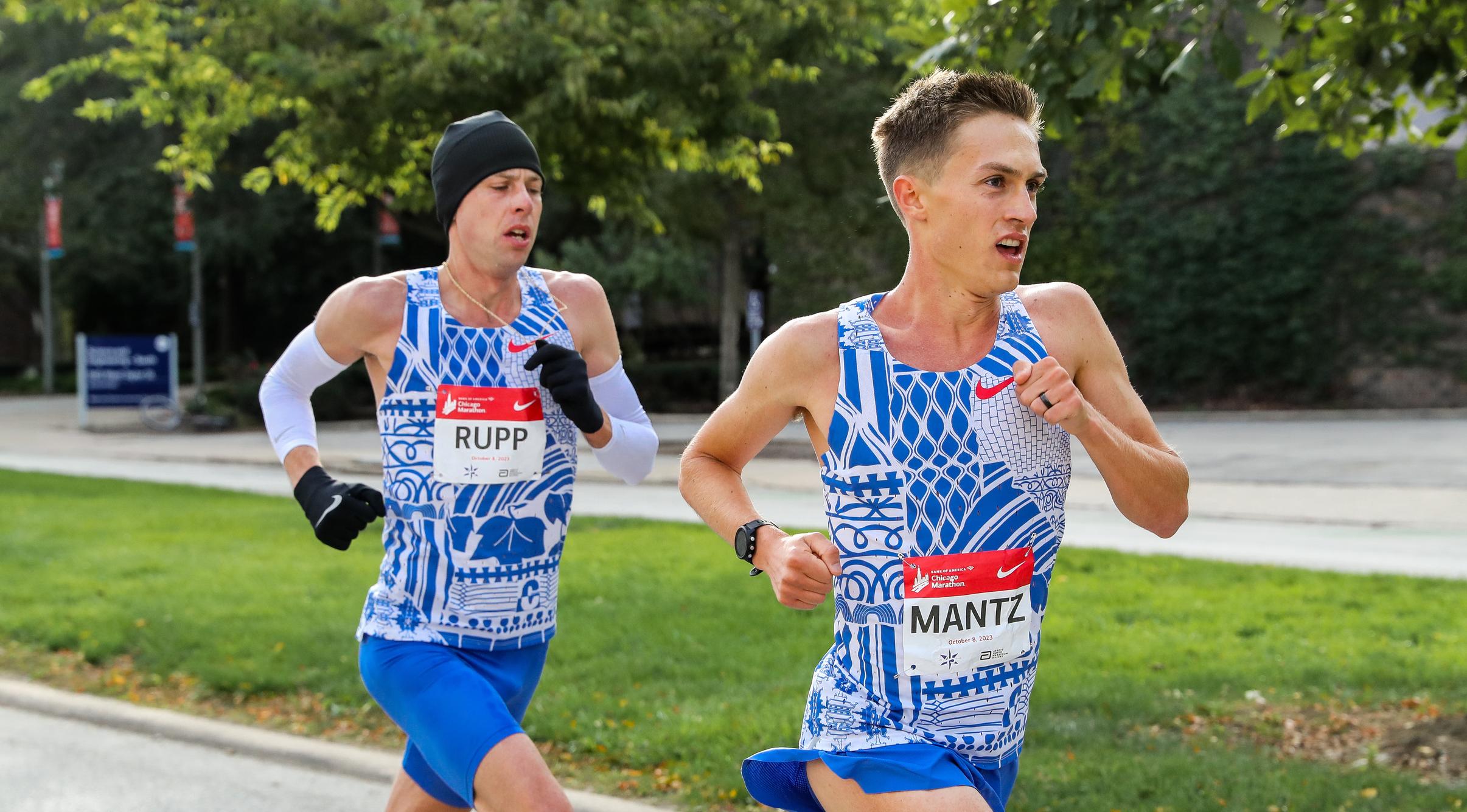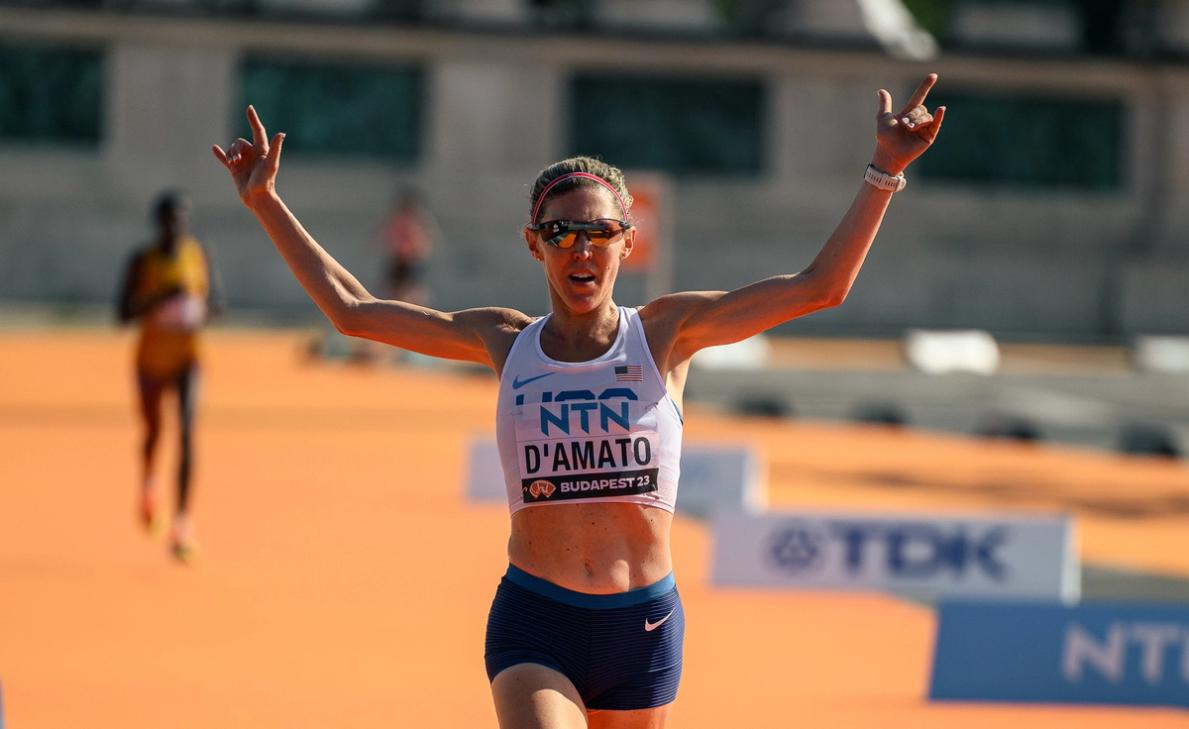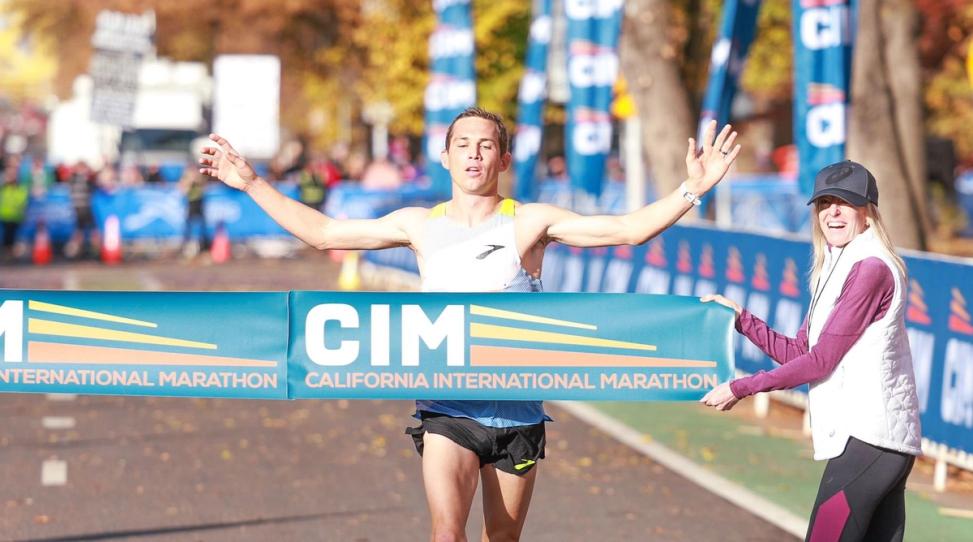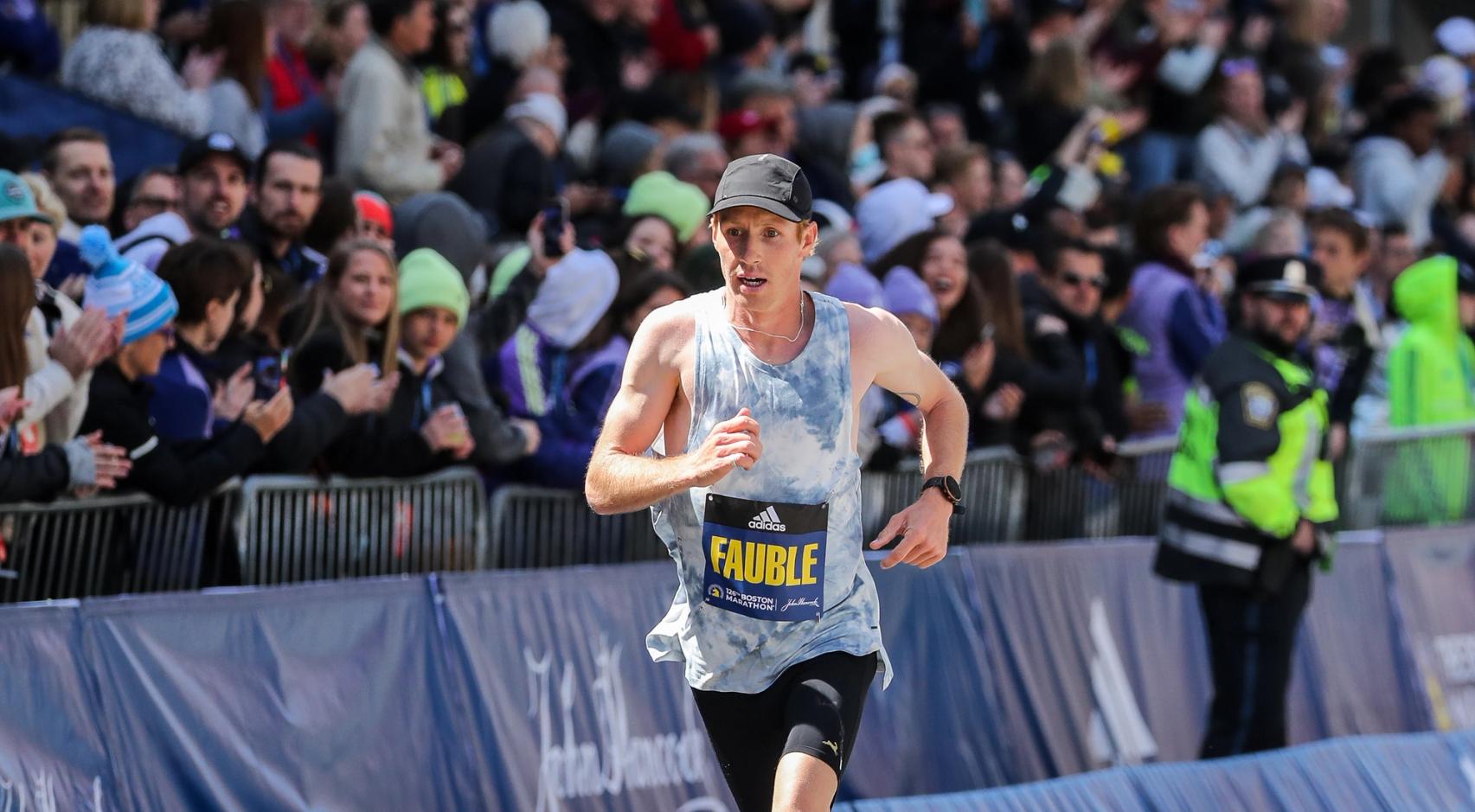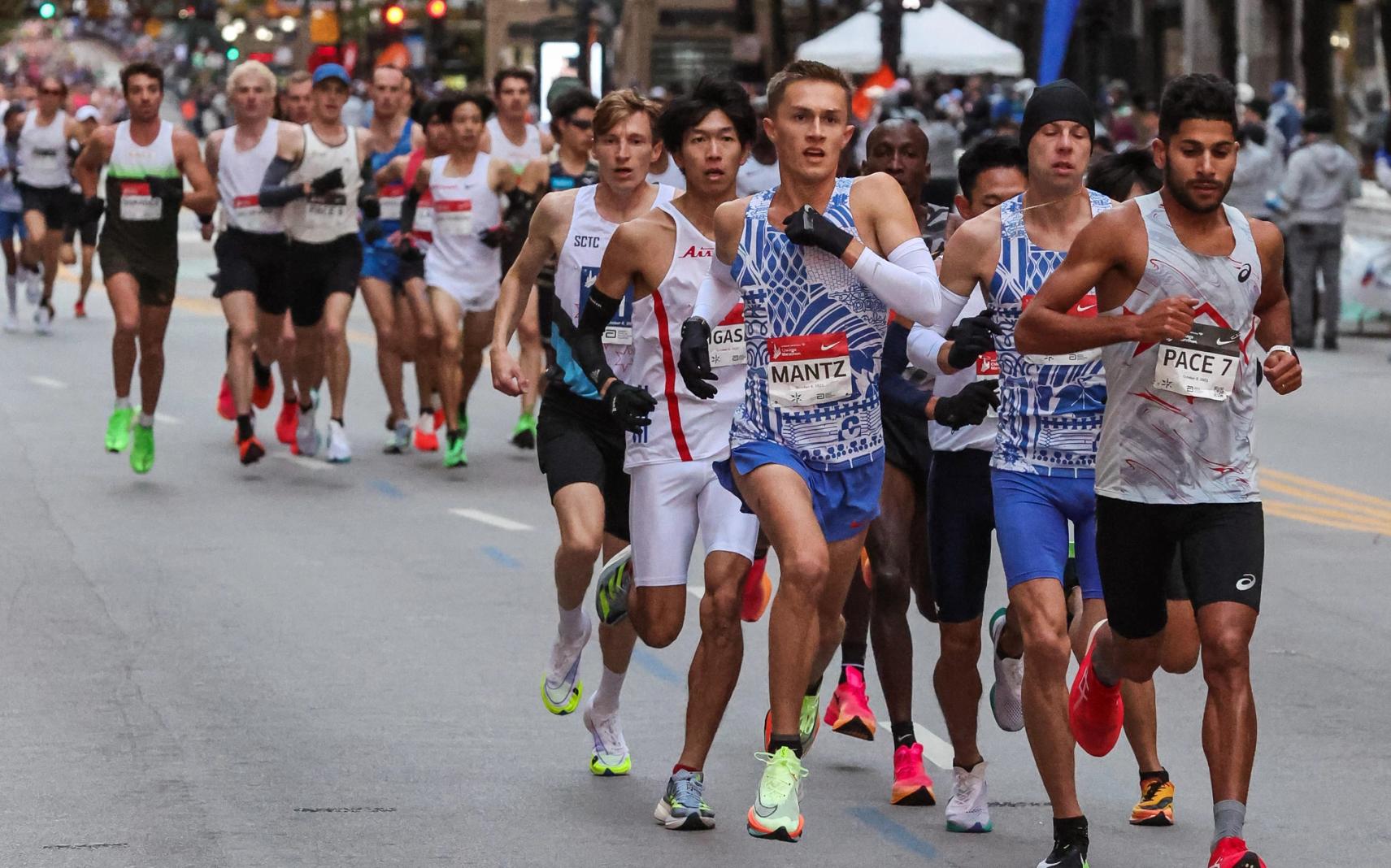By David Melly
January 31, 2024
Happy Olympic Marathon Trials week, to those who celebrate! The most fun event in American marathoning is almost here. In a few short days, hundreds of elite runners will take to the streets of Orlando, Florida, united by one shared goal: to represent Team USA at the 2024 Paris Olympics.
Some of the most dramatic moments of professional running in recent memory have played out at this race, from Bowerman Track Club’s team tactics in the heat of Los Angeles in 2016 to Abdi Abdirahman making an astonishing fifth Olympic team in Atlanta 2020. Olympic Trials debutants like Molly Seidel and Galen Rupp have gone on to win medals for the United States in the same year, and the heartbreak of failing to make a team can motivate future greatness, like Emily Sisson’s legendary 10,000m win at the 2021 track and field Trials after a DNF in Atlanta.
Whether you want to wow your friends and family with your encyclopedic knowledge or win your local pick ‘em betting pool, everything you need to know about the upcoming Trials race can be found below. If you haven’t read the women’s preview yet, you can find it here.
Follow The Action
The men’s race begins at 10:10 a.m. E.T. on Saturday, February 3. If you can’t make it to Orlando in person, you can follow along at home with race tracking and live results online. The races will be streamed live on Peacock (subscription required) beginning 10:00 a.m. E.T. and then broadcast (on a tape delay) on NBC at 12:00 p.m. the same day.
CITIUS MAG is proud to partner with HOKA for all of the weekend’s festivities and celebrate everyone from the athletes looking to qualify for Paris to those everyday heroes and 9-5 workers who somehow found a way to run fast enough to toe the line against the best. Our HQ will be the CITIUS CAFE at 151 E. Washington Street. Come on by as we have a whole weekend of programming, live shows and a shakeout run scheduled. HOKA will also be unveiling its newest racing shoe this week and we’re excited to be part of that launch.
You can also follow our live social media coverage on Twitter and Instagram as well as catching up on athlete interviews both before and after the race on our YouTube channel.
Before we get to the athletes to watch, there are also a number of key factors that may affect the outcome of the first selection event of the year for Team USA.
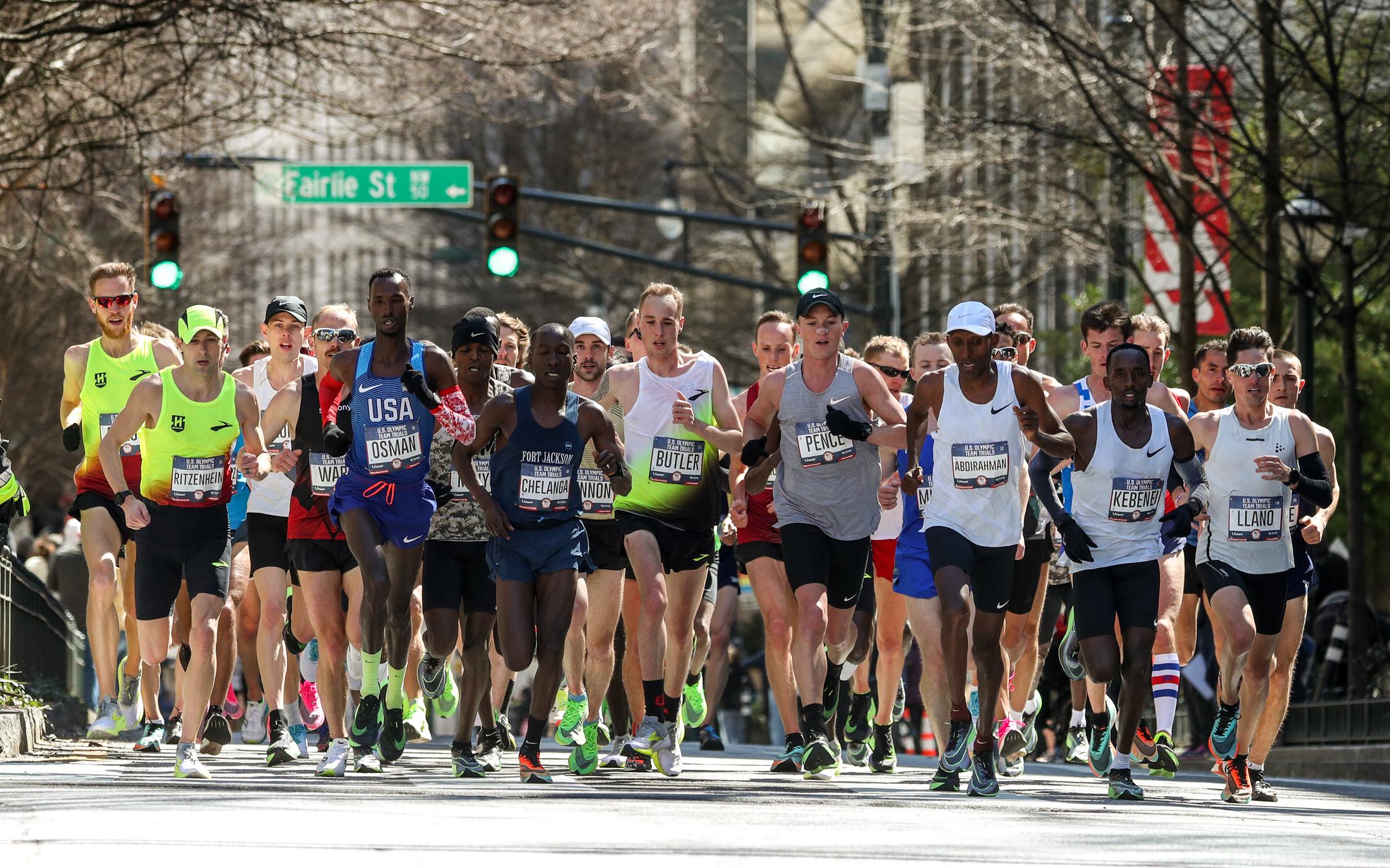
Kevin Morris / @KevMoFoto
How Does Qualifying Work?
Unlike the women’s race, where the top three finishers will almost certainly have their spots on Team USA locked up by 1pm on Saturday, the men’s path to Paris is much murkier. That’s because only two Americans have hit the steep 2:08:10 Olympic qualifying standard, which means that the team selection process will draw from a complex medley of USATF and World Athletics rules and procedures using a combination of rankings points, “B” standards, and calculations following springtime races. Basically, the final team may be undecided until May.
For what it’s worth, the CITIUS MAG group chat, which is full of professional track and field nerds, some of whom have worked full-time in the sport for the last decade, is still not entirely sure what different race scenarios will yield in terms of qualifiers. If you want to try and unpack the system yourself, feel free to peruse our explainer article from the Lap Count or the USATF qualifying procedure document on your own time.
If you’re lazy (or just as confused as we are), here’s what we think would be the outcomes of several different scenarios:
Third place runs 2:08:10 or faster: Top three all go to Paris! This is simple and easy, but unlikely: only 7 American men in history have ever run this time (although to be fair, four of them are in this race).
One or more of the top three only has the “B” standard of 2:11:30: In that case, spots are allocated based on world ranking – but not necessarily your world ranking. If the U.S. ends up with an athlete inside the top 80 on May 5th in addition to Clayton Young and Conner Mantz (who’ve run the standard), Team USA “unlocks” a third spot. If USATF follows its selection procedures the way we interpret them, they’ll send the top three finishers at Trials who have run under 2:11:30 (on or before Feb. 3) if they get three spots, regardless of who unlocks them.
One or more of the top three doesn’t have the “B” standard: Now we’re getting into less likely, but still possible, scenarios where the top three finishes aren’t necessarily named to the team. In this instance, USATF will send the top two or three finishers with the B standard (depending on how many spots are unlocked) using descending order – so there is a chance, although fairly small given the 17 runners in the field with the B standard, that fourth place or deeper could make the team.
Confused yet? The TL;DR is that the most likely scenario is that the top two at Trials are definitely going to Paris, and the third guy is probably going, but won’t know for sure until May 5th.
The Course And The Weather
In every marathon, two big factors help determine the race outcome as much as the athletes’ preparation: the course and the weather.
Much hay has already been made over the choice to host the Trials in Orlando, Florida, a city where temperatures can climb into the 80s even in February. All you need to know now is that USATF and the Greater Orlando Sports Commission did – following a formal request from qualified athletes – agree to move the start time from noon to 10 a.m. in hopes of reducing the amount of time that athletes will be running in the warmest part of the day.
Right now, the forecast looks to be on the warmer, but still manageable, side with a high of 72°F. Most of the race will likely be run with temperatures in the mid-60s. There’s a small chance of rain and a bit of a breeze, but it doesn’t look like it’ll be unreasonably wet, windy, or humid. In short – it will be a little warmer than ideal marathoning conditions, but unless the outlook changes drastically in the next few days, there’s no reason to suggest fast times are completely out of the question. That being said, mid-60s weather may still feel quite warm for anyone from the Northeast or upper Midwest who didn’t trek down to Florida early to acclimatize.
The course is a relatively flat set of loops through downtown Orlando, beginning with a 2.2-mile mini-loop before setting out on three 8-mile circuits. On-site spectators will get to see their favorite runners at least three times, but runners out on the course won’t be too overwhelmed by the monotony of endless loops. The steepest climb on the course is a roughly half-mile stretch starting around miles 4.5, 12.5, and 20.5, with a gain of around 34 feet. It’s not quite the PB-making machine that looped courses like the Marathon Project or the McKirdy Micro Marathon boasted, but it’s nowhere near as challenging a profile as Boston or NYC.
And now, here are the big names we’re looking to follow in a barn-burner of a men’s race on Saturday.
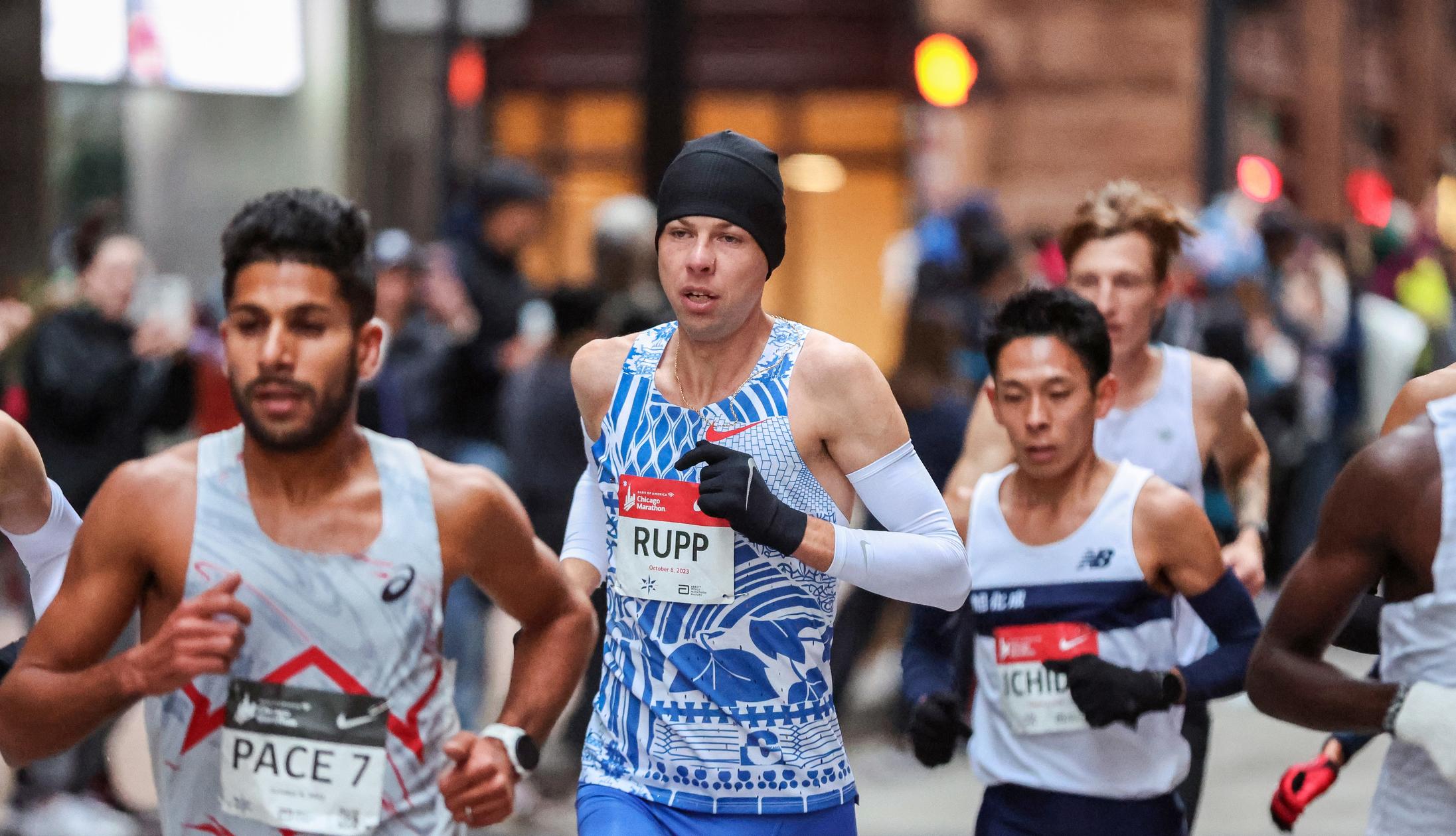
Kevin Morris / @KevMoFoto
The Reigning Champ
One of the clearest signs that a lot can change in four years is that the 2016 and 2020 Olympic Trials champ is not considered, by some, the favorite. Galen Rupp had some doubters headed into 2020 as well, coming off Haglund’s surgery and a coaching change fueled by the disbanding of the Nike Oregon Project. But a decisive victory in Atlanta and an eighth-place finish at the Tokyo Olympics put any lingering questions about Rupp’s status as the top American marathoner to rest – at least for a little while.
Fast forward to 2024, and things look very different for the defending champ. Back injuries limited Rupp’s training in 2022. He only managed a 19th-place finish at the 2022 World Championships (he was still top American), did not finish the NYC Marathon, and was only the third American in Chicago in 2023. Rupp did run 2:08:48 in Chicago, his fastest time since the same race two years earlier, but he set out at sub-2:07 pace through halfway and faded fairly significantly in the latter miles.
At 37 years old, it does seem premature to close the book on the only American man in the last 20 years to earn an Olympic medal in the marathon, but Rupp can hardly be considered a lock to make his fifth team. All that said, if he’s back in peak form, no one in the field has shown they can match him and we may be in for a three-peat, making the preceding paragraph sound very silly. Even if he’s not 100%, he could still contend for the Olympic team, but it’s a legit possibility that the longtime distance star may not end up on the podium.
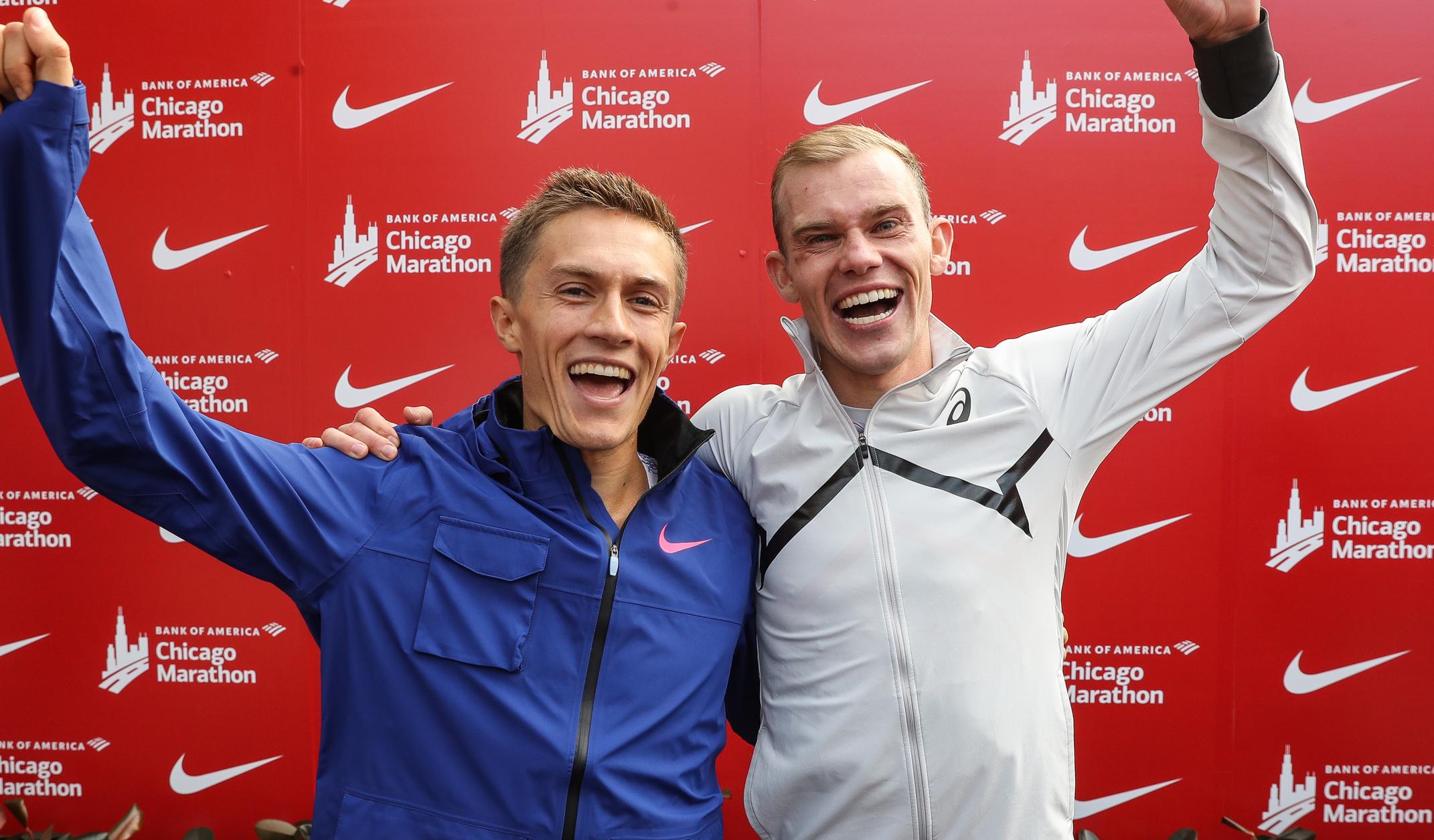
Kevin Morris / @KevMoFoto
The New Kids on the Block
If the Olympic Marathon Trials had betting odds, Conner Mantz would likely be the favorite. The 27-year-old and his training partner Clayton Young, both BYU grads and still under the guidance of longtime coach and 2x Olympian Ed Eyestone, are the only two runners in the field who’ve hit the Olympic standard of 2:08:10. After running 2:08:16 in his debut in Chicago in 2022, Mantz, a two-time NCAA cross-country champion, quickly entered the conversation of “America’s next great marathoner.”
In three career marathons, Mantz has run 2:08 (Chicago ‘22), 2:10 (Boston ‘23), and 2:07 (Chicago ‘23), finishing first, third, and first among Americans. While he doesn’t have a long road resume, it’s safe to say he was the top American marathoner of 2023 and will enter the Trials with a target on his back. However, before you pencil him in for a spot on Team USA, there are two main reasons critics might be skeptical of Mantz’s chances. The first is that he’s never made a U.S. team or won an NCAA title on the track, and even marathons still sometimes come down to a tactical battle rather than a war of attrition. The second is that, around the time of the Manchester Road Race in November, Mantz had a stress reaction in his femur and spent several weeks recovering. He purports to be back to full fitness, but a major training-limiting injury that close to Trials has to be a cause for some concern.
Clayton Young hasn’t had as smooth a transition to the marathon as his former college teammate, but he has improved in each of his four tries: from 2:29 at the 2020 Olympic Trials, to 2:16 at Chicago ‘21, 2:11 at Chicago ‘22, and finally his Olympic-qualifying 2:08:00 in his third Chicago last year. A pessimist could look at Young having 50% fewer 2:08-caliber performances than Mantz as a sign that consistency is a concern; an optimist would point to the ASICS runner’s trendline as a sign he’s learning the distance. And after getting knee surgery last February, Young did have a stellar 2023 on the roads overall, with two U.S. titles at 8km and 20km and a 5th-place finish at the Falmouth Road Race in the midst of a marathon build. And you can’t discount the benefit of racing with a training partner at Trials – just ask Shalane Flanagan and Amy Cragg in 2016.
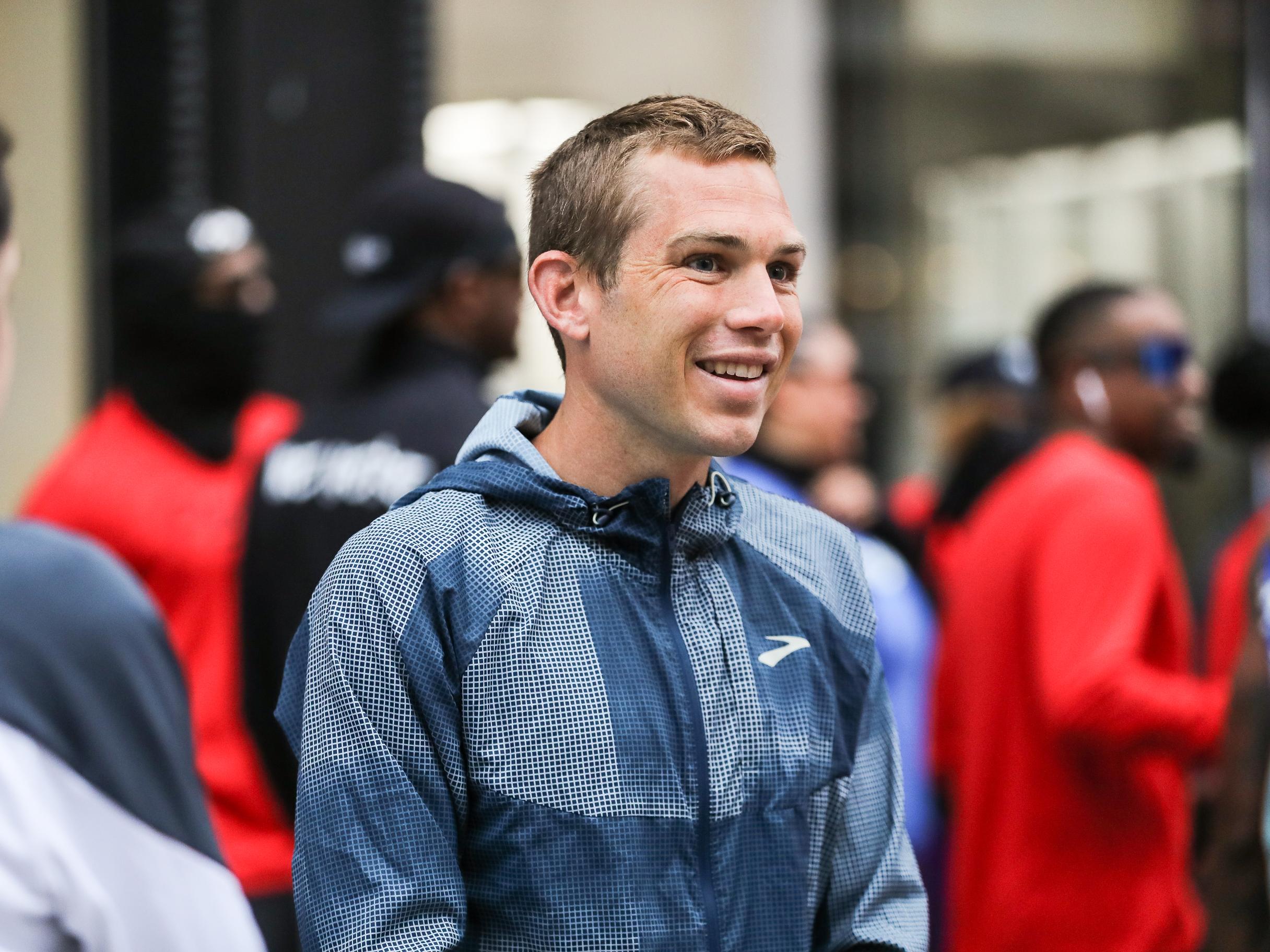
Kevin Morris / @KevMoFoto
The X-Factor
The most exciting question headed into Trials weekend might be: What the heck is CJ Albertson going to do on race day?
The enigmatic and unorthodox Brooks runner has made a name for himself in some circles over the last few years for his high mileage weeks on Strava, his insane workouts, and his fearless racing (and race scheduling). More casual fans were likely introduced to Albertson at the 2021 Boston Marathon, where he led the race for 20 miles before finishing 10th overall and generating headlines like “Who Was That Guy Leading The Boston Marathon For So Long?”
Five of his last six marathon finishes have been between 2:10:23 and 2:11:09, but because four of those races were point-to-point downhill races, he only snagged the Olympic “B” standard with his 2:11:08 victory at the Baja California Marathon in Mexico last December. The kicker? It was only seven short days after his 2:11:09 win at the California International Marathon, a one-week double that’s fairly unprecedented in the world of professional marathoning.
If anyone is likely to take the race out hard and put the hurt on Rupp, Mantz, and Young, it seems like Albertson is both a likely candidate and a legitimate threat. Normally, the running peloton will allow for one or two athletes to open up small gaps in the first half of the race with the confidence that they can reel in any foolhardy souls in the closing miles, but Albertson tends to defy conventional racing logic and if he manages to form a big early lead, the field would be wise to take him seriously.
Can he make the team? It’s certainly possible. A conservative start and a hard last 10k would probably not play to Albertson’s advantage, and going out too fast and dying doesn’t usually yield good results for anyone. It’s a delicate balance that may play out dramatically and very publicly on Saturday’s broadcast.
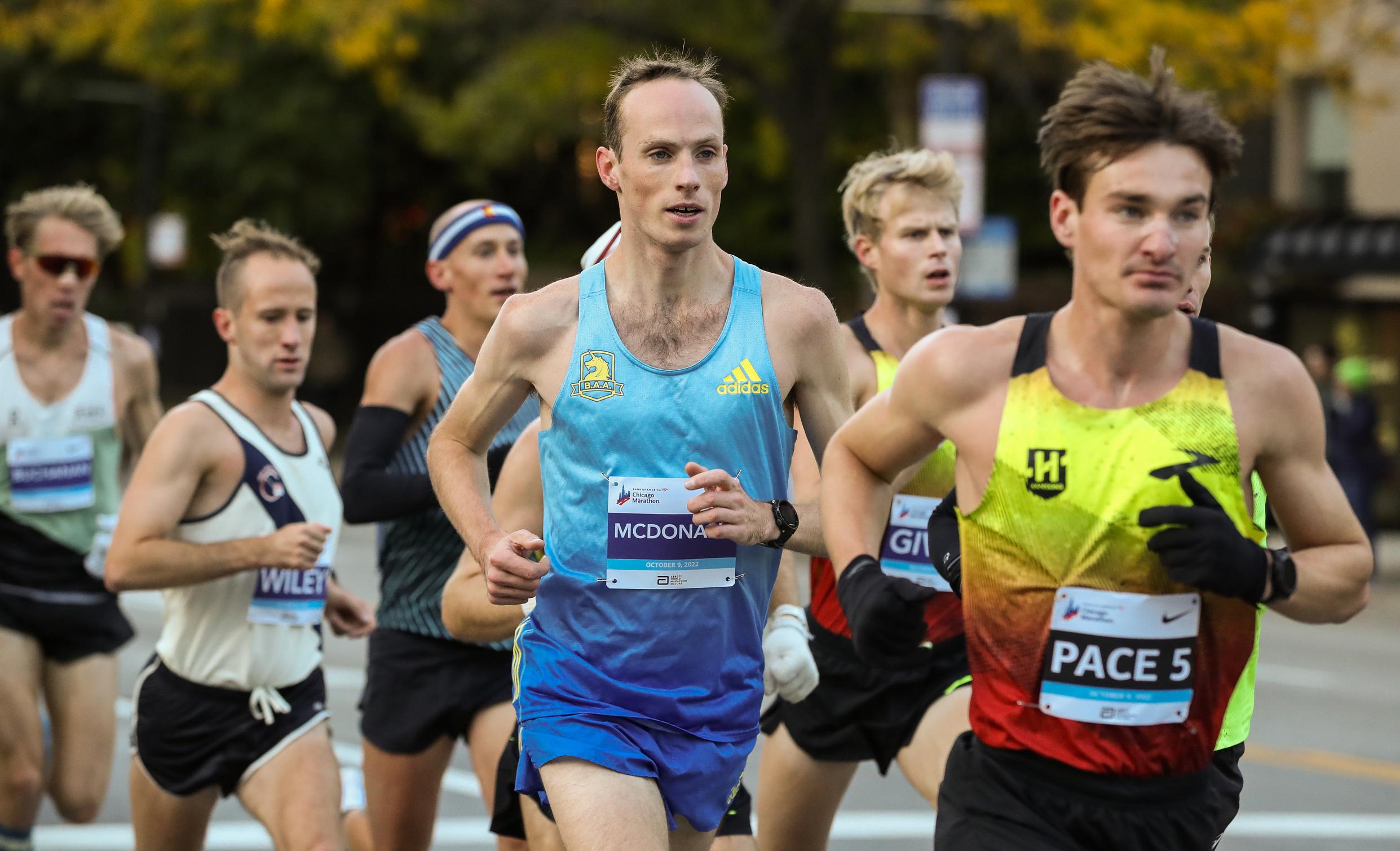
Kevin Morris / @KevMoFoto
The Reliables
Unlike the women’s field, which is incredibly top-heavy with multi-Olympians and record holders past and present, the men’s competition is a little more in flux. No one can quite seem to agree on who the “favorites” are, and it seems far more likely that a true dark horse ends up on the men’s podium than the women’s.
If you’re looking for guys who’ve made a career out of consistency in a highly variable event, this is the section for you. A quick shorthand for an American marathoner’s achievement on the international scene is high finishes at a World Marathon Major, and runners like Scott Fauble, Elkanah Kibet, Nathan Martin, and Matt McDonald have a long record of strong performances at Boston, NYC, and Chicago.
Scott Fauble has arguably the best resume in the field on that scale, with five top-10 finishes at World Marathon Majors and a 2:08:52 personal best from Boston 2022. The one major knock against Fauble is that he followed up a 9th-place finish at the 2019 Boston Marathon with only a 12th-place finish at the 2020 Marathon Trials, where he was considered among the pre-race favorites to make the team. He enters 2024 with a chip on his shoulder from the last Trials as well as a bit of a comeback narrative from last fall, where he was forced to drop out of the 2023 Berlin Marathon with fueling issues.
Elkanah Kibet has represented Team USA at the World Championships (and serves his country in the U.S. Army as his day job), and his fourth-place finish from the 2021 NYC Marathon was surely an Olympic-caliber performance. The knock on Kibet is that, at 40 years old, he isn’t getting any younger, but he has run many of his best races in the last two years and set his lifetime best at age 38 at Boston in 2022.
Nathan Martin always seems to perform well in New York City, most notably with an eighth-place finish in 2021, and he’s the fastest American-born Black man in the marathon with a 2:10:45 personal best set at Grandma’s Marathon last summer. Like Martin, Matt McDonald of the Boston Athletic Association also has put up quality performances in big races, finishing 10th at Boston last year and landing between 12th and 14th at majors several other times. In the last few years, he’s gotten very good at running between 2:09 and 2:11. He finished 10th at Trials in 2020 and is certainly a better runner by all measures one cycle later.
It’s hard to call any of these guys unknown or unexpected should they find themselves in the top three on Saturday, but a podium finish would certainly represent a breakout performance years in the making.
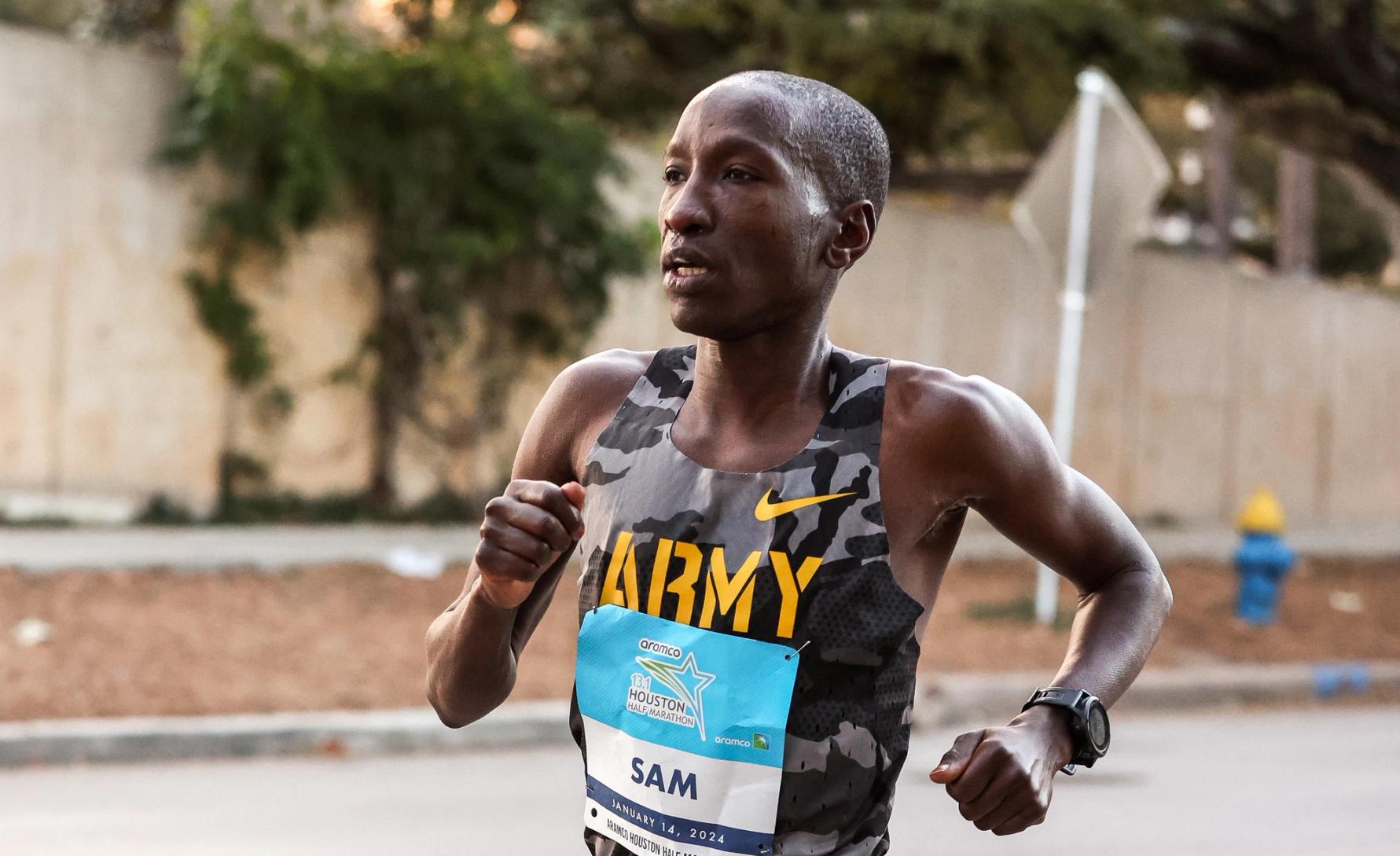
Kevin Morris / @KevMoFoto
The Veterans
Similarly to the guys mentioned above, it wouldn’t be a huge shock that one or more of the names in the top three are at least somewhat familiar to anyone who’s followed track and field over the last decade. Former 10,000m stars like Sam Chelanga and Leonard Korir have found success in the marathon and very well may be in contention to make an Olympic team at the tail end of their careers.
Chelanga is a veritable Lazarus of track and field, living and dying through more up-and-down career cycles than almost anyone in the sport. Until 2023, his marathon PB was only 2:15:02, hardly a time that would be considered in legitimate contention for the top three, even with a half marathon PB of 60:37. But his 2:08:50 in Chicago, only steps behind Galen Rupp, changed everything. Now he’s the fourth seed headed into Orlando and seems to have his best shot at an Olympic team in at least two cycles. That being said, his 20th-place finish at the Houston Half Marathon wasn’t an impressive tune-up – but you can’t ever read too much into mid-buildup performances.
Leonard Korir might be our pick for the guy in the field who’s not being talked about enough. The sixth-fastest American in history with a 2:07:56 PB has had a quiet start to the decade after making three straight U.S. teams in 2016, 2017, and 2019, but he still picked up at U.S. title over 25k in 2023 and notched a 2:09:36 performance at the Paris Marathon. His recent DNF in Chicago isn’t a fantastic sign of consistency or success, but the fact that an Olympian who finished fourth at the 2020 Marathon Trials isn’t in the conversation as much as any of the other favorites is silly.
A few other names who might show up big on race day are newly-minted American Teshome Mekonen, a 60:02 half marathoner who ran 2:10:16 in Berlin last fall, Andrew Colley, who bounced back from his own DNF in Atlanta to run a pair of 2:11s in 2023, and Brian Shrader, the former steeplechaser who finally broke out of the 2:12 doldrums with a 2:09:46 at Chicago last fall.
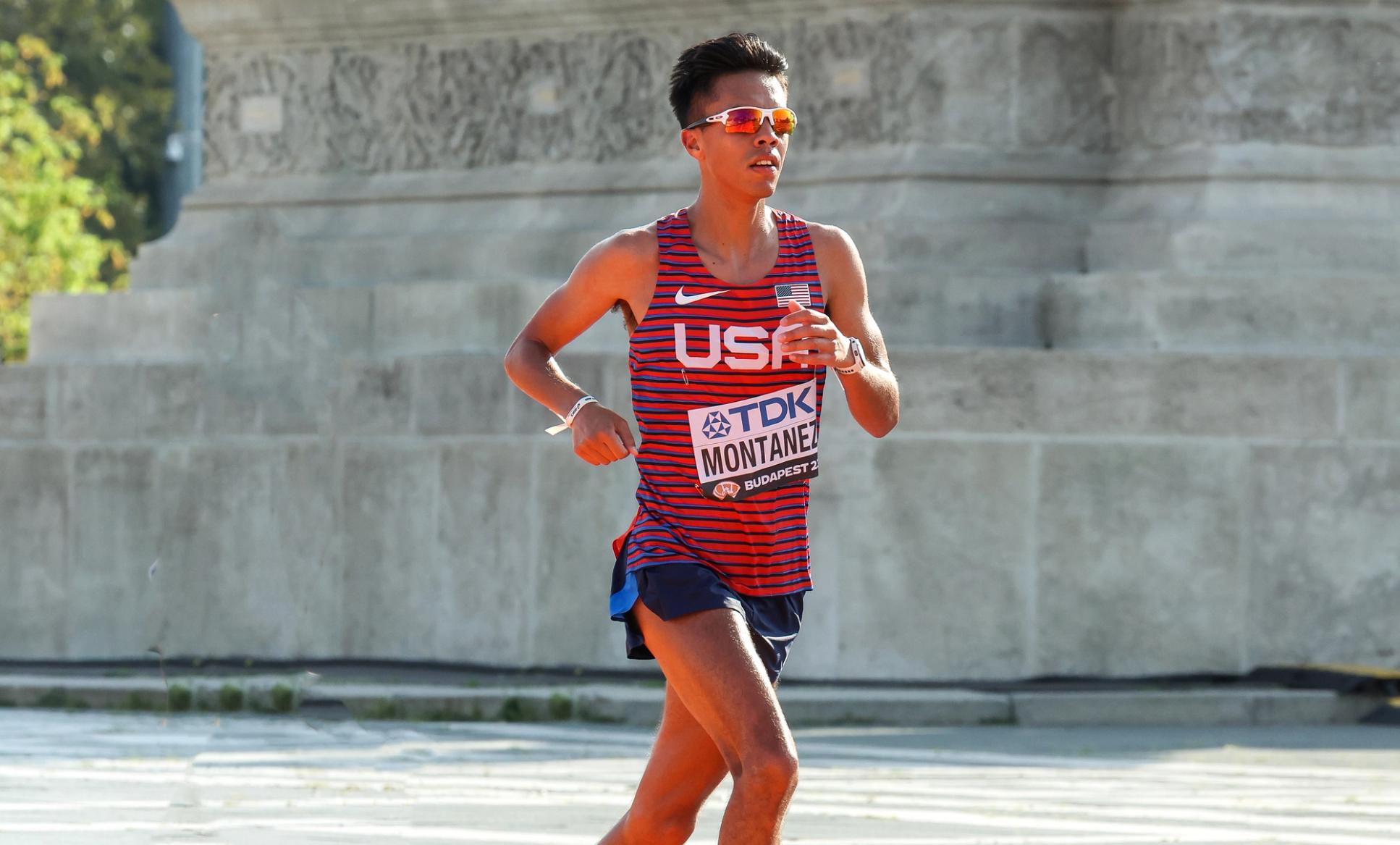
Kevin Morris / @KevMoFoto
The Up-And-Comers
In addition to the more proven commodities in the race, there’s also a crop of talented guys with big upsides who haven’t quite broken through in the marathon yet. That category includes runners like Biya Simbassa, Jacob Thomson, Parker Stinson, and Nico Montanez, who have won USATF titles on the roads at shorter distances but don’t yet have a signature 26.2 performance to their names. Frank Lara took two good stabs at fast times in London and Chicago last year, and the general consensus is that when he puts the pieces together he’ll be a threat to run 2:08.
CITIUS and Hoka did a mini-doc on 8x NCAA All-American Futsum Zienasellassie, now in his second stint with NAZ Elite as a pro and looking to solidify his place in the ranks of U.S. marathoners. He’s had a decent start that includes a win at the 2022 California International Marathon and a 2:09:40 showing at Rotterdam last spring, and after a 10th-place finish in NYC last fall it seems like he’s entering the conversation of top Americans in any race he enters. Similarly, Zachery Panning was the top American at Worlds last year with a 12th-place finish, and his 2:09:28 PB from Chicago in 2022 shows he can roll with the big dogs.
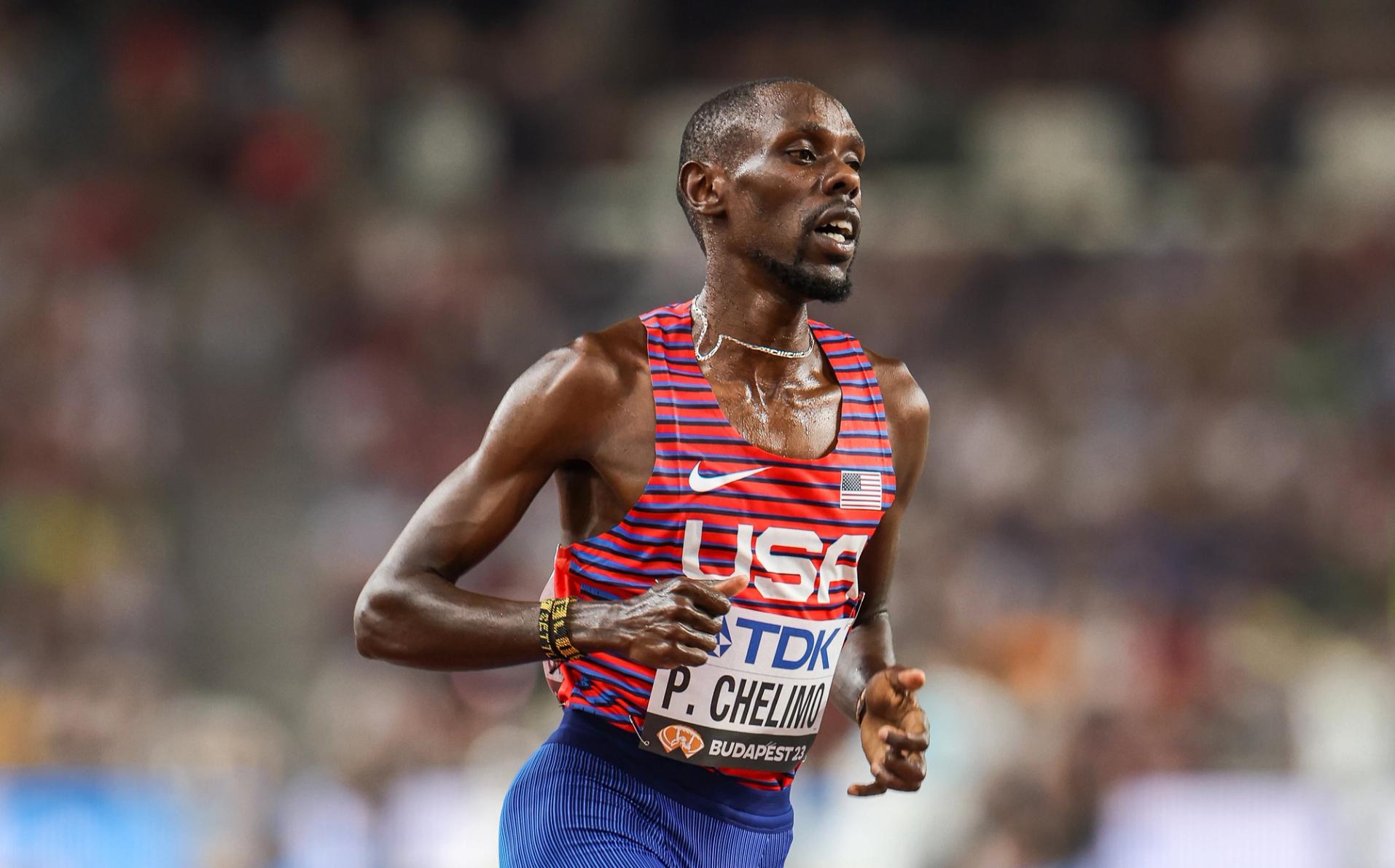
Kevin Morris / @KevMoFoto
The Intriguing Debutant
In 2016, Galen Rupp entered the Olympic Marathon Trials with a whole bunch of national titles, a silver medal on the track, but no prior experience over 26.2. How’d it go for him? Well, a year later he had a 2:10:05 PB and his second Olympic medal.
That’s almost exactly the circumstances Paul Chelimo finds himself in heading into Orlando. The charismatic and occasionally kooky Olympian qualified via a 62:22 half marathon and after teasing his entry for a while, confirmed last week via Instagram that he was competing. Chelimo is a little older than Rupp was when making his marathon debut (33 years old vs. 29 years old), but he’s still shown he has wheels, making the World final last year in the 5000m and running a 10,000m personal best of 27:12.73.
How seriously he’s committing to the roads is another question, but there’s no doubt that Chelimo has the talent to make the team if he stays healthy and goes all-in on the marathon. The big catch for him is that, in order to be selected, he needs to run under 2:11:30 at Trials – not an impossible task, but he can’t hope for a pedestrian pace and a blistering kick to send him to his third Olympics.
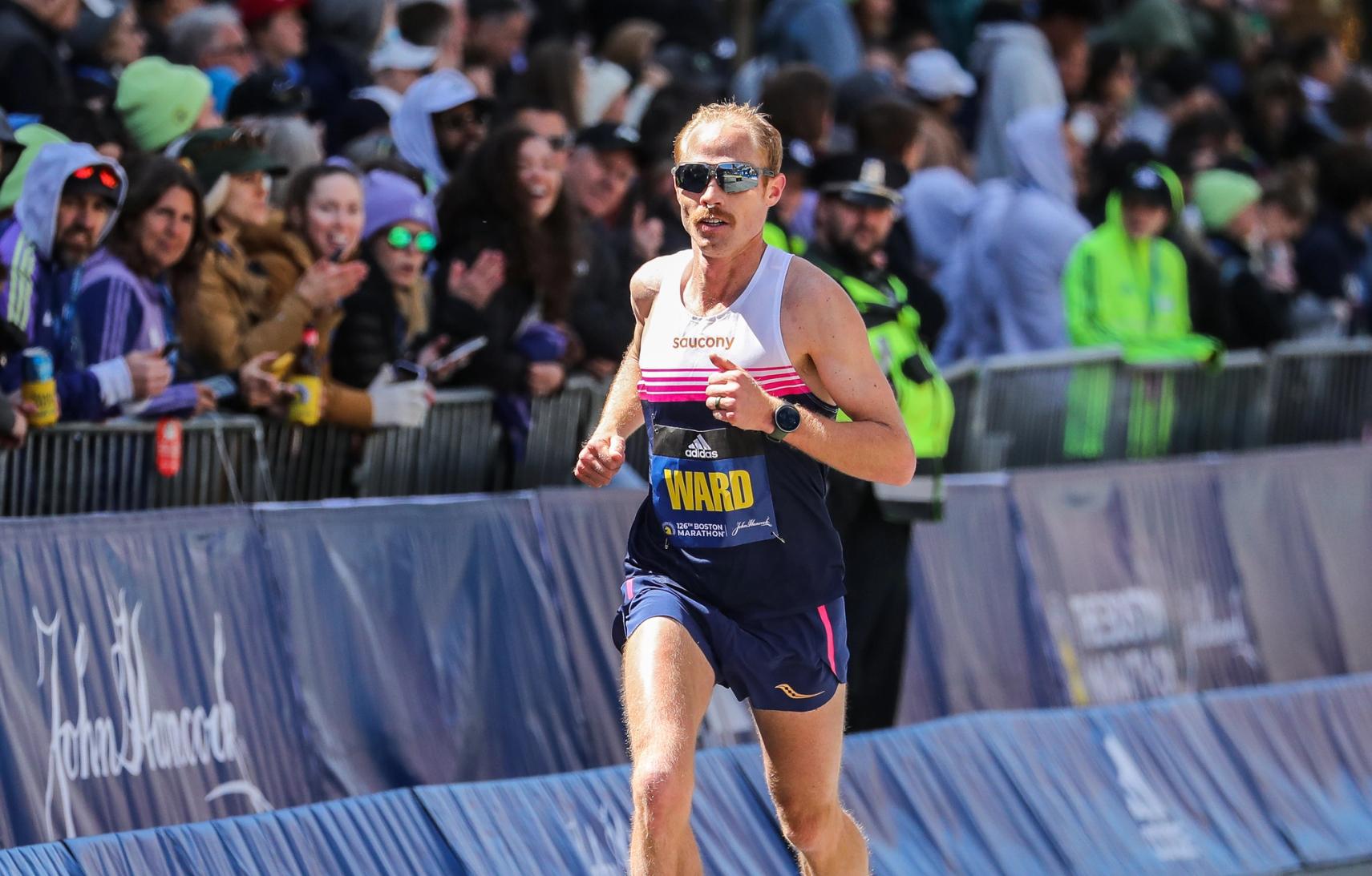
Kevin Morris / @KevMoFoto
The “What If?”
Despite the fact that this preview has already touched on 20 potential names to make the team, there are a few guys that you can’t truly count out. For the most part, it seems like this might not be the right time for this crew, but if you like betting on past experience and long odds, you can’t forget about guys like 2016 Olympians Jared Ward (update: Ward has withdrawn) and Shadrack Kipchirchir, Syracuse stars Martin Hehir and Colin Bennie, or D3 folk hero Noah Droddy on his journey back from Haglund’s surgery. And while it would be crazy to see him in contention, we have to give a shoutout to five-time Olympian Abdi Abdirahman for hitting the start line at age 47 just for the hell of it.
We look forward to your shouted complaint that we forgot your favorite athlete or that our predictions are way off base – and even more than that, we’re looking forward to being proven right or wrong on race day. Good luck to all!
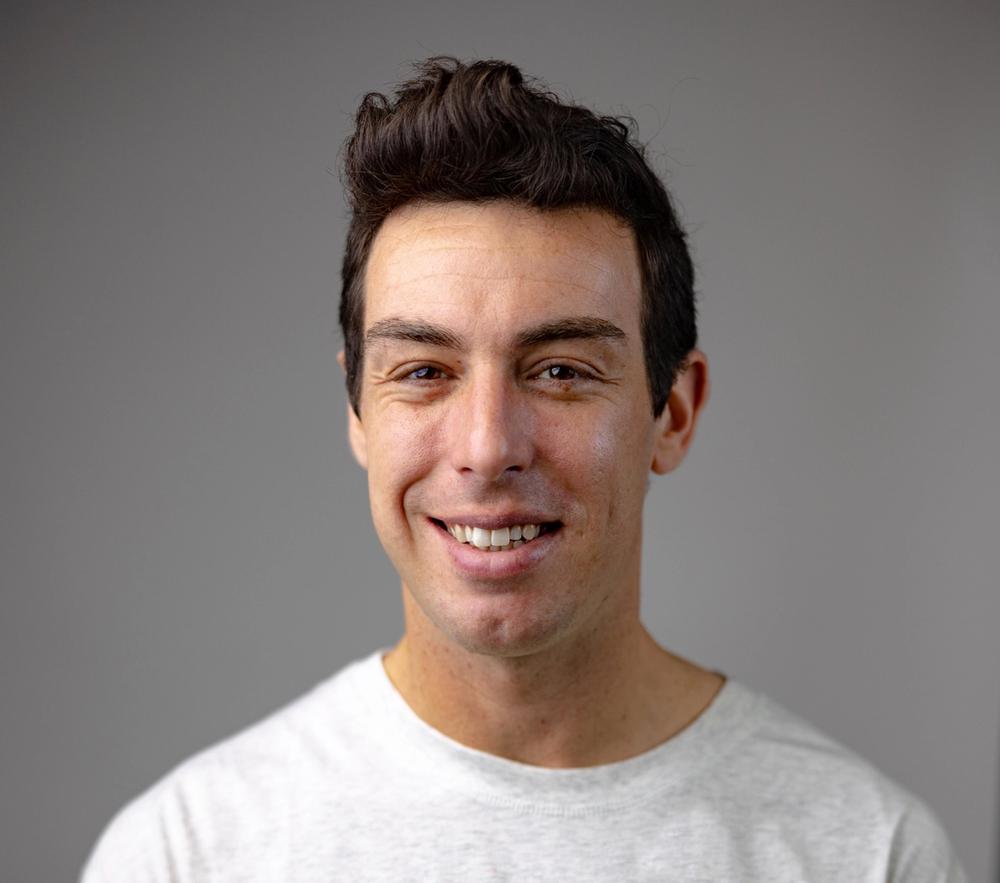
David Melly
David began contributing to CITIUS in 2018, and quickly cemented himself as an integral part of the team thanks to his quick wit, hot takes, undying love for the sport and willingness to get yelled at online.
